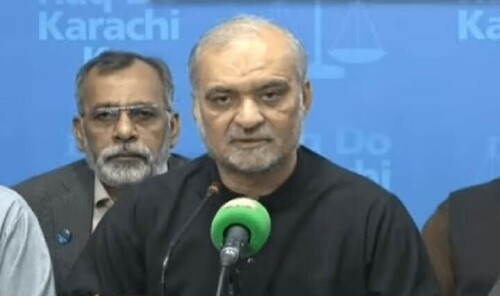KARACHI: Karachi Institute of Kidney Diseases (KIKD), the second state-of-the-art facility of its kind in the public sector alongside the Sindh Institute of Urology and Transplantation (SIUT) in the city, still awaits the provincial government’s attention as it is being run solely by philanthropists.
The KIKD, which remained non-functional till 2017 since its establishment in 2009 due to non-availability of funds, started conducting dialysis last year with a few machines with the assistance of donors and is now conducting dialysis of 75 patients every day in three shifts on 25 machines with privately-hired staff.
In March this year, City Mayor Wasim Akhtar formally inaugurated the KIKD where about 2,000 dialysis sessions are conducted monthly.
Dialysis of 75 patients every day is performed in three shifts on 25 machines with privately-hired staff for free
According to KIKD medical superintendent Dr Khurram Daniyal, dialysis of over 20,000 patients was conducted free of cost at the facility in 2018 alone. “Besides, the patients are also given facility of free medicines, including expensive injections of erythropoietin and blood tests,” he added.
The institute, which is under the administrative control of the Karachi Metropolitan Corporation and declared a unit of the Abbasi Shaheed Hospital, has monthly expenditure of over Rs4 million generated through donations as no official funding is available to run the facility.
The KMC in 2012 sent to the provincial government a Schedule of Establishment showing the numbers of posts which were required for the efficient performance of KIKD functions, but the proposal was still pending approval with the Sindh local government department.
KMC’s senior director, health, Dr Birbal Genani told Dawn that the last reminder for the approval of the proposal was sent to the local government secretary on May 12, 2018, but to no avail as no response was given to the municipal administration.
He said that the KMC had established a kidney centre at the same building in 2012, but it could not offer treatment to patients until 2017. However, upon insistence of the mayor, it conducted first dialysis in November 2017 and provided medicines to patients.
Water shortage at facility
While the non-availability of funds and staff remains a major problem for efficient working of the facility, the Karachi Water and Sewerage Board also fails to ensure smooth supply of water to it adding to additional financial burden on the KIKD as water bowsers are bought to meet the need.
The KIKD chief said that there were two water connections to the facility, while the KWSB provided a 2,000-gallon water tanker daily. However there was still a shortage of water which was being arranged privately through donors. “Around 300 litres of water is required for one dialysis process,” he said.
Dr Daniyal said that the KIKD was the second biggest facility in the city providing dialysis free of cost. “This facility must be well equipped as the trend of kidney diseases is growing alarmingly in the country which is the eighth largest country with high prevalence of the diseases causing 20,000 deaths annually,” he added.
Causes and symptoms of kidney diseases
He said that most of the cases were reported from southern Punjab and interior of Sindh, mainly due to contaminated water, excessive use of aerated drinks and high protein diet.
The KIKD MS said that the leading cause of chronic kidney diseases were primarily diabetes, kidney glomerular diseases and high blood pressure in addition to excessive use of painkillers, uncertified herbal medicines, genetic disorders, defects at birth, stone disease, infections, environmental pollution, unhygienic conditions and old age.
He said some of the key symptoms of kidney diseases included swelling on face and feet, fatigue, lack of appetite, blood in urine, frothy urine and difficulty in breathing. “But, unfortunately most of the patients get their kidneys already damaged by the time symptoms appear”, he said.
Dr Daniyal advised people to monitor the functioning of their kidneys through “Urine D/R and Serum Creatinine Test” after every six months.
Patients and their relatives said that at the KIKD they didn’t have to wait for hours for their turn as happened in other public-sectors facilities.
Twenty-five-year old Munir Shah, an employee of Pakistan Steel, has been on dialysis for the past 16 months in the two public-sector facilities as his employer no more gives medical facilities to its employees.
“I come here three times in a week for dialysis,” he said.
Mr Shah was into muscle building some three and half years ago. “I saw an advertisement of medicine for muscles and used it. My blood pressure shot up and I got my kidneys damaged,” he recalled.
A 10-year-boy, Hammad, was diagnosed with a kidney disease a year ago and has been on dialysis since then. His uncle said that they were earlier visiting the SIUT where they had to wait for long hours for their turn.
Published in Dawn, July 21st, 2019














































Dear visitor, the comments section is undergoing an overhaul and will return soon.